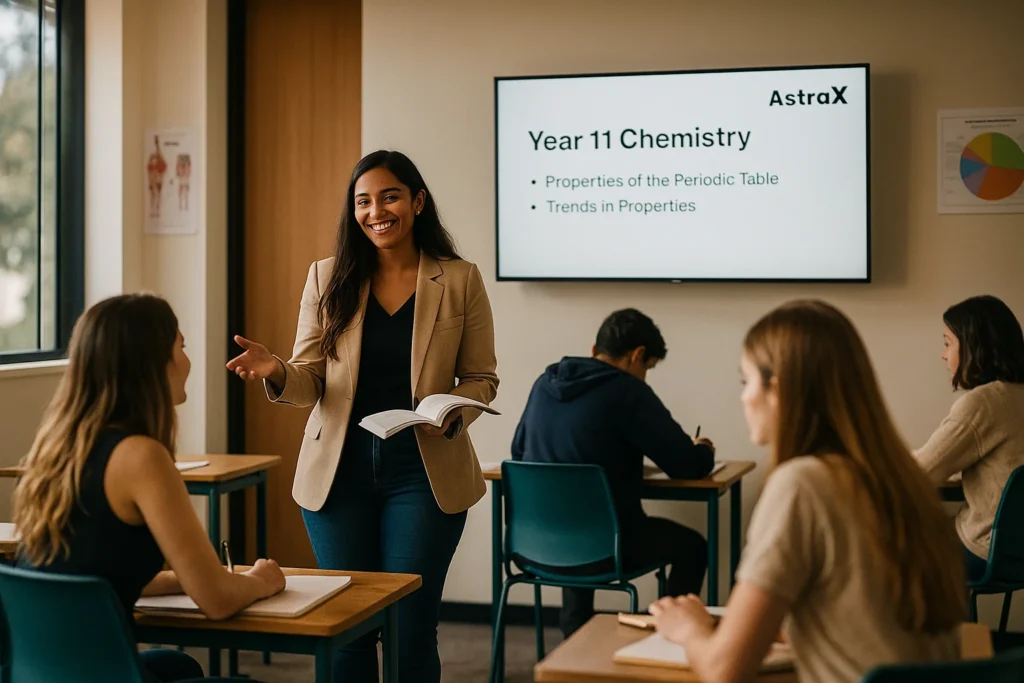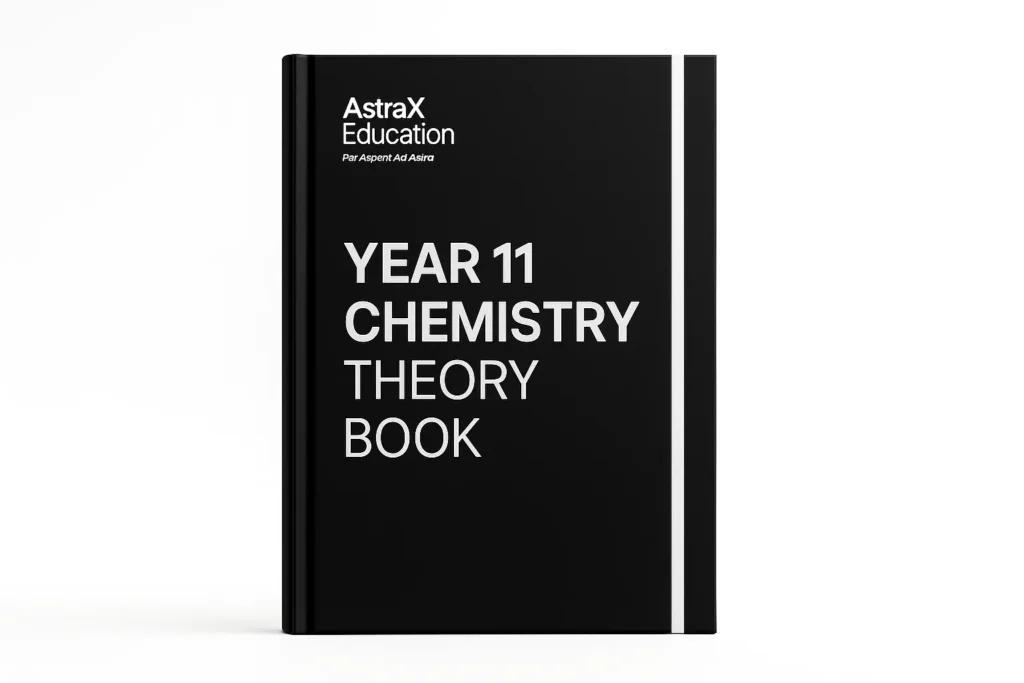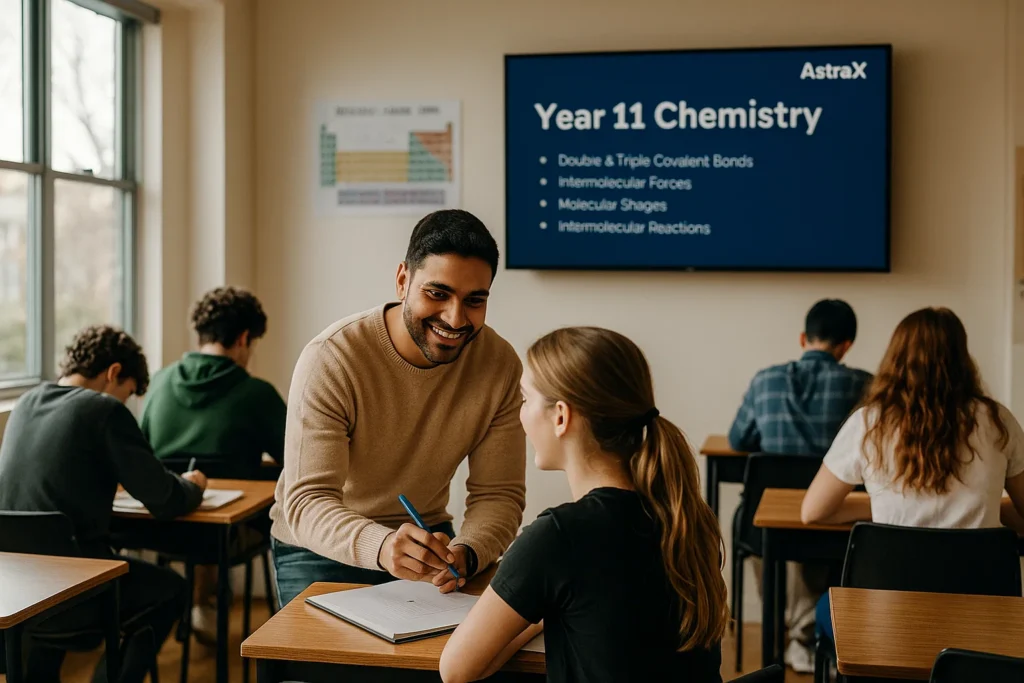Years 11 Chemistry Tutoring in NSW & Online
Master the mathematical rigour and conceptual depth required for medicine, dentistry, and high-ATAR success
Year 11 Chemistry destroys unprepared students. The jump from Year 10 Science to mole calculations, equilibrium mathematics, and abstract bonding theory catches even strong students off-guard. Those aiming for medicine discover Chemistry can make or break their ATAR. Our program builds the mathematical fluency, conceptual understanding, and problem-solving precision that transforms Chemistry from a stumbling block into a scoring advantage.

Weekly Theory Lessons with Premium Booklets
Students receive expertly structured weekly lessons supported by comprehensive booklets. These materials are designed to help students become top performers by mastering core concepts step-by-step. We conduct regular assessments and provide live, interactive feedback to ensure every child progresses confidently.

Online Learning That Works.
Our online classes deliver the same (or better) results as face-to-face learning. No time wasted on travel, flexible scheduling, access to recordings, and consistent access to Sydney’s best tutors—right from your home.

Expert Teachers Who Know the NSW Syllabus
Our tutors are handpicked specialists who not only understand the syllabus but also know how to teach it in a way that clicks. Their experience and personalised approach make all the difference.

Term-by-Term Outline
Properties & Structure of Matter (Oct–Dec)
This foundational term introduces students to the atomic and molecular structure of matter, covering the essential theories that underpin all chemical behaviour.
- Atomic structure and development of atomic models
- Understanding the periodic table and electron configurations
- Chemical bonding: covalent, ionic, metallic, and molecular geometry
- Introduction to nuclear chemistry and radioactivity
Outcome:
Students will build a solid understanding of atomic theory, bonding, and nuclear processes—core concepts that support all future chemistry learning.- Atomic structure and development of atomic models
Quantitative Chemistry & Chemical Calculations (Feb–Apr)
In this term, students focus on developing accuracy and fluency in chemical calculations, a critical skill for mastering reactions and experimental analysis.
- The mole concept: molar mass, Avogadro’s number, and stoichiometry
- Gas laws: Boyle’s, Charles’, and the Ideal Gas Law
- Solution chemistry: calculating concentration, dilution, and preparing standard solutions
- Performing stoichiometric calculations for reactions
Outcome:
Students will confidently carry out quantitative chemical calculations, strengthening their analytical and problem-solving abilities for higher-level chemistry.- The mole concept: molar mass, Avogadro’s number, and stoichiometry
Reactive Chemistry & Electrochemistry (Apr–Jun)
This term dives into the chemical reactivity of substances, focusing on redox processes, electrochemical systems, and limiting reactants in reactions.
- Redox reactions: identifying oxidation and reduction, half-equations
- Galvanic cells: structure, function, and real-life applications
- Identifying limiting reagents and calculating percent yield
- Applying reactivity principles to solve practical chemical problems
Outcome:
Students will develop the ability to analyse and solve reaction-based problems, with particular emphasis on electrochemical systems and redox reactions.
Energy Changes & Drivers of Reactions (Jul–Sept)
The final term focuses on understanding what drives chemical change, exploring thermodynamics and reaction feasibility through energy transformations.
- Thermochemistry: heat of reaction, enthalpy changes, and calorimetry
- Understanding entropy and the second law of thermodynamics
- Calculating and interpreting Gibbs Free Energy
- Predicting spontaneity and feasibility of chemical reactions
Outcome:
Students will be fully equipped for Year 12 Chemistry with a clear understanding of the energy principles that govern chemical reactions in both theoretical and real-world contexts.
What's Included
Weekly Lessons with Expertly Designed Theory Booklets
Each week, students are guided through structured theory lessons supported by high-quality, syllabus-aligned booklets. These booklets are designed to develop deep understanding and help students become top performers.
Specialist Tutors, Not Just Generalists
Our teachers are subject-matter experts who know how to break down complex topics and explain them clearly. They focus on building your child’s confidence and capability week by week.
Progress Monitoring with Individual Feedback
Our tutors continuously monitor student progress in class and through lesson work, offering personalised feedback and support where it’s needed most.
Small Class Sizes for Real Attention
Our group classes are capped to 5 students per class to ensure students receive the right level of support and engagement. Every student is seen, heard, and supported.
Expert Academic Support for Parents
We keep parents in the loop with regular updates and offer guidance on how to support your child’s learning journey at home and beyond.
First Lesson Money-Back Guarantee
Try AstraX with peace of mind—if you're not satisfied after the first lesson, we'll refund you. No stress, no risk
Pricing
Group Classes (Maximum 5 Students)
Term Course: 12 weekly lessons-
Maximum of 5 students per class for optimal attention
-
NSW syllabus-aligned content, covering key focus areas
-
Theory and workbook
-
Free trial session available
1-on-1 Private Tutoring
Term Course: 12 weekly lessons-
Complete, personalized attention for each student
-
NSW syllabus-aligned content
-
Tailored lesson plans for accelerated learning
-
Theory and workbook
-
Free trial session to experience our approach
EXCELLENTTrustindex verifies that the original source of the review is Google. A really cooperative environment to work in! Staff are very friendly and will help you whenever you need.Trustindex verifies that the original source of the review is Google. Finally seeing real progress Honestly didn't think we'd find anything that would help my daughter but AstraX proved me wrong. She went from barely passing English at 65% to getting 80% last term. What I love most is how patient the teachers are - they actually take time to explain things until she gets it. No rushing, no making her feel stupid. Online classes are a lifesaver for us working parents too. Just grateful we found them.Trustindex verifies that the original source of the review is Google. I am writing this review for AstraX Education because my son is getting very good results. The teachers are very sincere people, treating students like their own family. When my son had exam tension, they were calling to give encouragement and support. This type of care you will not find in big tuition centers. Online class system is working very well. No need to drop and pick up, very convenient for parents My wife is very happy with this arrangement. All families in our community, I am telling them about AstraX. Very reliable and trustworthy center. If you want your children to get good marks and build confidence, definitely try AstraX Education. You will not regret.Trustindex verifies that the original source of the review is Google. AstraX Education – Exceptional Tutoring Experience AstraX Education has made a huge impact on my learning journey. The quality of tutoring provided by AstraX, particularly Shayekh and Zainul was amazing. I’ve had the privilege of being tutored by them at AstraX Education, and I can confidently say they are among the best tutors I’ve ever had. Before finding AstraX Education, I had some disappointing experiences with other tutors, but Shayekh and Zainul completely changed my perspective. Their passion for teaching and commitment to their students’ success are unmatched. Shayekh is an incredible tutor who has a remarkable ability to simplify difficult concepts. He doesn’t just teach; he ensures you truly understand every topic before moving forward. His structured approach to problem-solving helped me develop confidence in tackling even the most challenging math problems. What sets Shayekh apart is his calm and patient demeanor—he never rushes through explanations and always finds new ways to help students grasp the material. One of the things I admire most about Shayekh is his real-world approach to teaching mathematics. He connects theories to practical applications, making the subject engaging and meaningful. Learning from him has significantly improved not only my grades but also my overall problem-solving skills and logical thinking. Zainul is another phenomenal tutor at AstraX Education. His dedication and enthusiasm for teaching make every lesson both productive and enjoyable. He has a unique way of breaking down complex topics into simple, easy-to-understand concepts. Instead of just focusing on formulas and solutions, Zainul ensures you understand the “why” behind everything, which has deepened my appreciation for mathematics. What I appreciate most about Zainul is his adaptability. He tailors his teaching style to fit each student’s needs, ensuring that no one feels left behind. He is incredibly patient and willing to explain things in different ways until you fully grasp them. Thanks to his guidance, my confidence in math has skyrocketed, and my grades have improved significantly. AstraX go beyond just helping students achieve better grades—they inspire a genuine love for learning. Their teaching methods are engaging, effective, and tailored to ensure every student reaches their full potential. If you’re looking for an amazing tutoring service, I highly recommend AstraX Education. Whether you’re struggling with math or looking to excel further, Shayekh and Zainul are the best tutors you can find! Thank you to AstraX for the incredible service and dedication.
Ready to See the Difference? Book a Trial Lesson
Experience our proven teaching methodology with a complimentary trial lesson designed for your child's academic needs.

